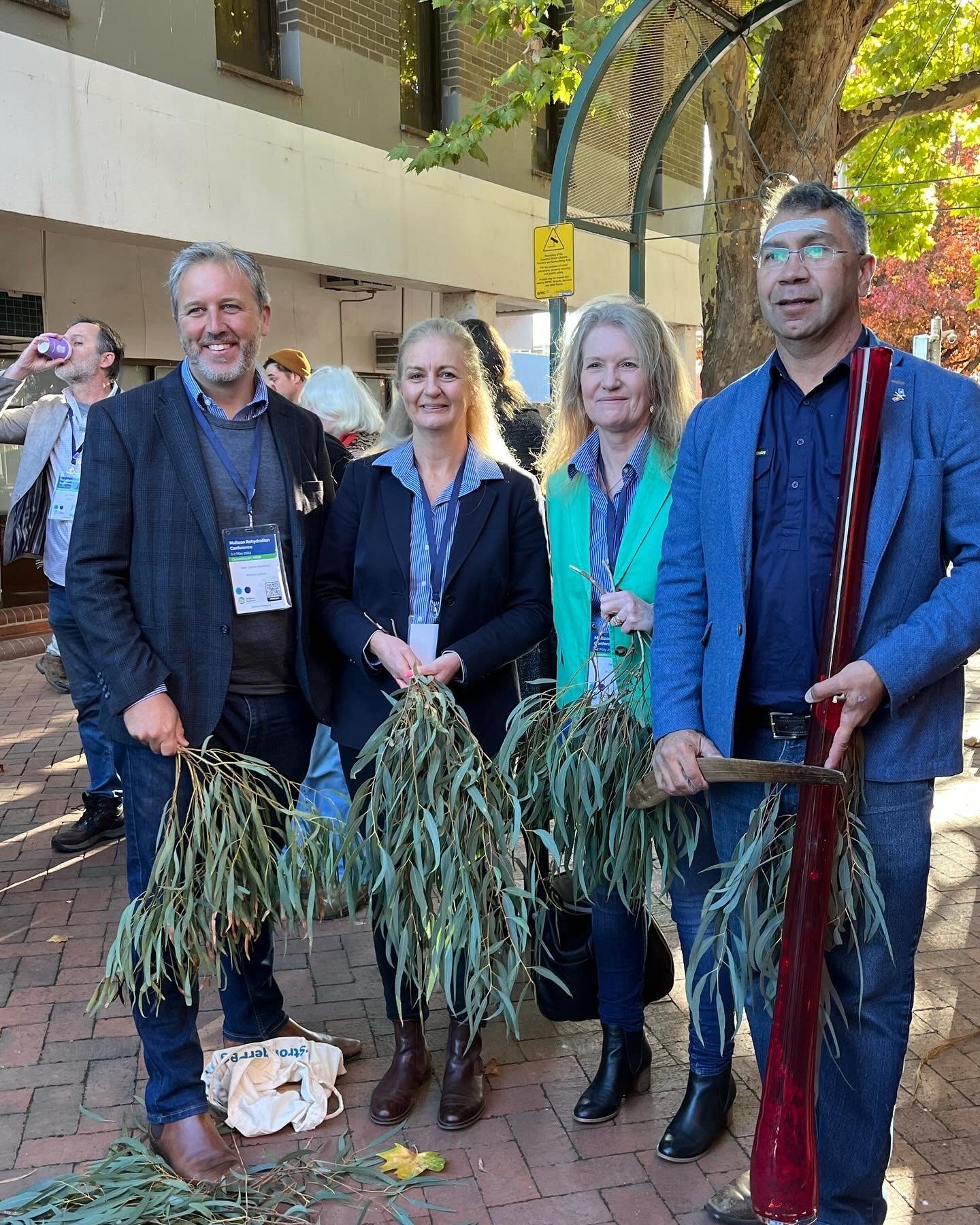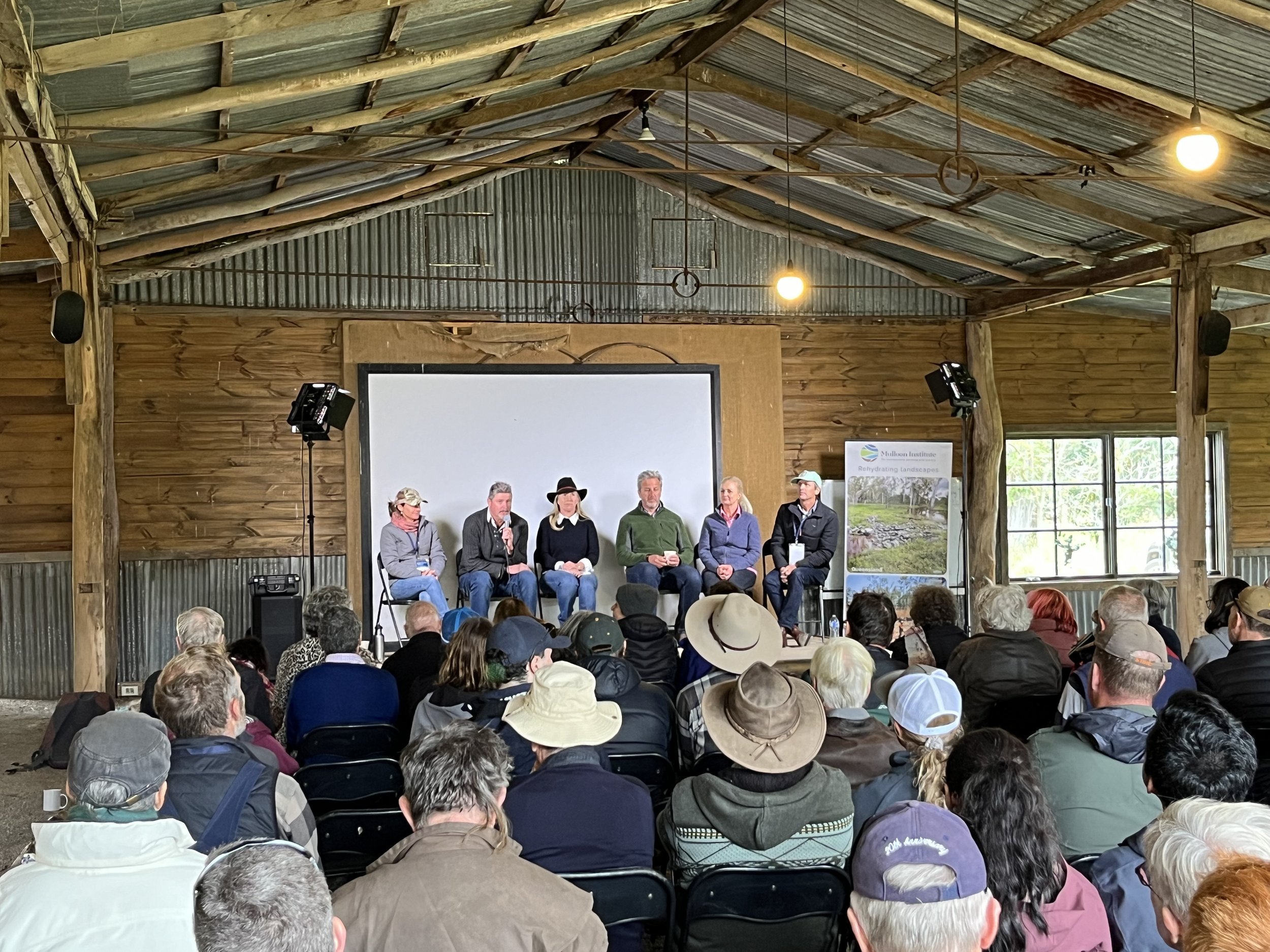Left, Kathy Kelly – Director and Company Secretary with Carolyn Hall, CEO and Managing Director.
The Mulloon Rehydration Conference, held at Bicentennial Hall in Queanbeyan and the Farms on 1–2 May 2024, has ushered in a new chapter for Mulloon Institute, and introduced our 180-strong audience to the latest scientific learnings. It was an opportunity to present the building blocks we have put in place to rehydrate and restore landscapes across Australia.
To meet the challenge of climate change we need rehydrated and functioning landscapes full of biodiversity, a healthy small water cycle and increased energy coming from the sun.
We can see a future walking together with famers, our rural communities, our First Nations people, philanthropists and corporates into a more climate-resilient country.
Biosecurity, food and water security for our nation depend on functioning agricultural landscapes. This is what Mulloon Institute delivers. We cannot do this alone – collaborating with partners across the country makes this work possible.
Eighteen years of detailed scientific and observational data collected in the Mulloon catchment, in areas where we have installed landscape rehydration infrastructure is now the subject of sophisticated digital analysis. We are seeing proven increases in:
-
biodiversity
-
biomass production (regardless of weather)
-
connectivity between the stream and the floodplain
-
water volume downstream
-
water quality
-
riparian vegetation
-
invertebrates
-
frog diversity and numbers, and
-
native fish.
With the help of a dedicated team and many friends of Mulloon, we have built the foundational blocks and an adaptable real world model for restoring and rehydrating Australian landscapes. We have:
-
developed the technical expertise to hold water in landscapes across Australia
-
developed a process called bringing the community along that recognises that catchment repair is a social process
-
implemented a national education and capacity building curriculum
-
connected art and landscape rehydration
-
recognised the need for regulatory reform and what that reform should look like to make our work more accessible
-
acknowledged the need to scale this work and so developed CReST a spatial model that prioritises catchments across NSW for landscape rehydration, and
-
shared our work with people across the country, at Mulloon and through projects in North Queensland, Western Australia, Northern Territory, in Central Australia, Victoria and soon in Tasmania and South Australia.
Day 2 of the Mulloon Rehydration Conference wrapped up with a discussion around the future of landscape rehydration in Australia. L-R, Fiona McBean, Peter Hazell, Suzannah Cowley, Matt Egerton-Warburton, Carolyn Hall, Warren Pensini.
We know there is more work to do.
We plan to introduce an Indigenous-led and co-designed Water Stewardship certificate.
We plan extension of our tool to make monitoring catchment scale landscape rehydration works easier and more cost effective.
We are sharing our work with the world via the global Drought Resilience report to be presented at UNCCD COP 16 in Riyadh in Saudi Arabia in December 2024.
We are facing some serious challenges, not the least of which is the need for regulatory reform. Currently it is both expensive and time consuming to gain approvals for positive impact projects, which is why the Mulloon Law Committee is advocating at all levels for a National Code of Practice for Landscape Rehydration and Restoration, critical to the scaling up of this work.
Funding remains a challenge… which path do we take to ensure ongoing financial sustainability for our work into the future and to ensure we can scale landscape restoration? We urgently need more funding partners to collaborate with and support us to deliver restored and functioning landscapes across Australia. In particular we are looking to individuals, organisations and corporates that help drive the agriculture sector, and build and maintain our national infrastructure. Their engagement and philanthropy can positively impact and leverage our ability to rehydrate landscapes and generate environmental and social benefits to both local communities and the nation as a whole.
With your support, our small, dedicated and highly skilled team will continue to work tirelessly, together with our partners, to deliver landscape rehydration and restoration for a nature positive, secure and resilient Australia.
Thank you.




